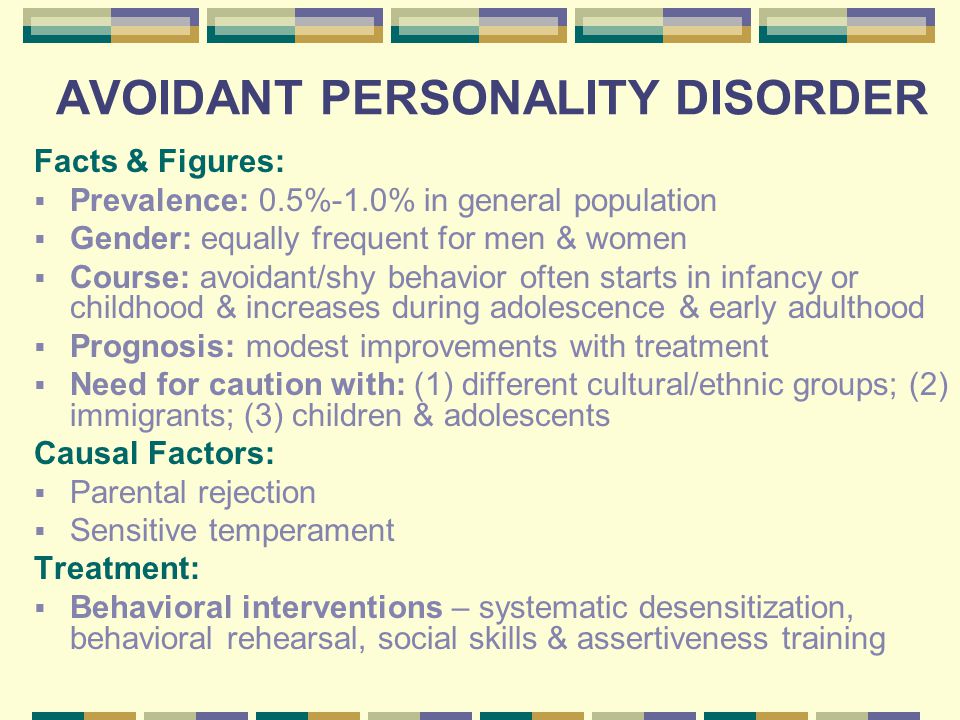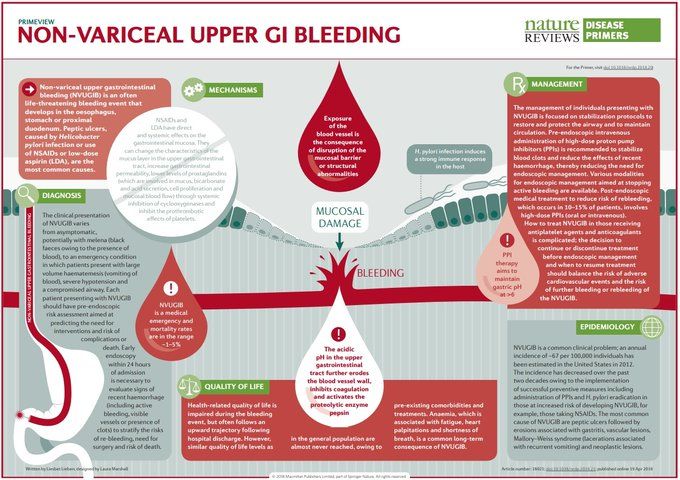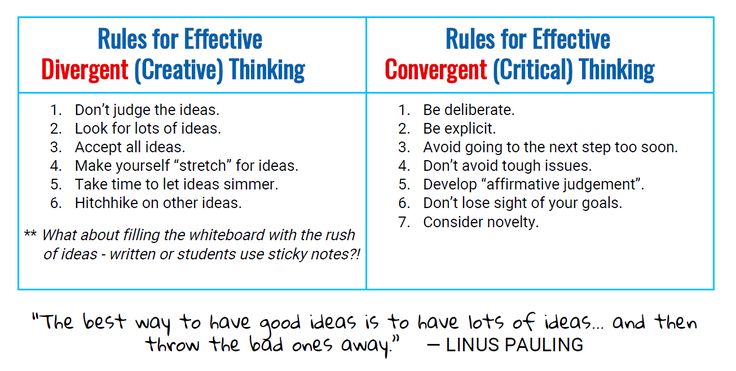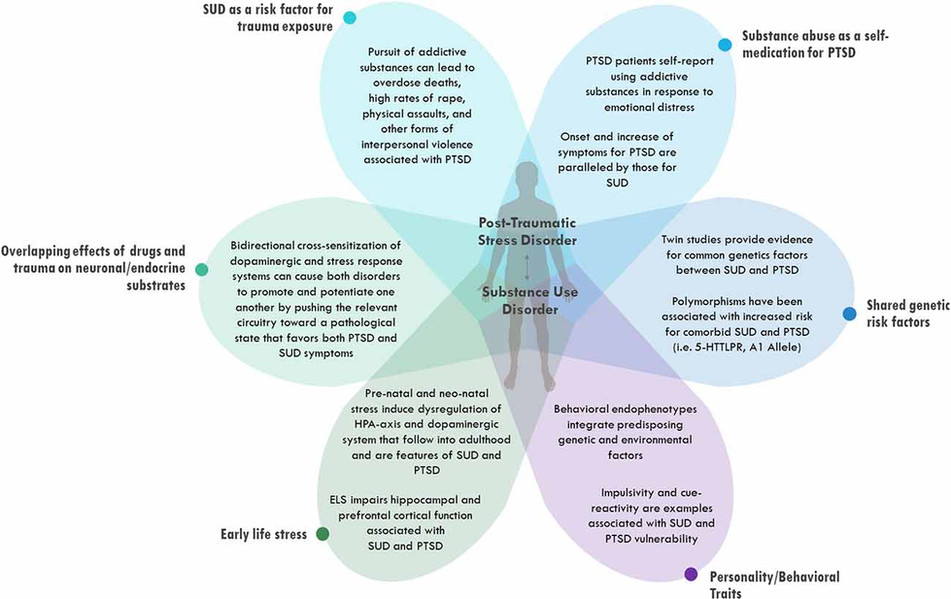Avoidant personality disorder romantic relationships
Avoidant Personality and Relationships: Does It Work?
Living with avoidant personality disorder may mean you skip most social situations, experience intense fear of criticism, and find it hard to share feelings. But you can still make relationships work.
Try to think of a time when someone hurt your feelings intensely and you withdrew into your own world for some space to heal. For some people with an avoidant personality, this may be an everyday reality in their relationships.
Avoidant personality disorder (AVPD) is a mental health condition characterized by:
- intense avoidance of social situations
- feelings of inadequacy
- sensitivity to criticism
This may mean people with avoidant personality and their romantic partners may face a few specific challenges in relationships.
According to the Diagnostic and Statistical Manual of Mental Disorders, 5th edition, text revision (DSM-5-TR), the formal symptoms of AVPD are:
- avoiding jobs or other occupational events that may involve interacting with other people
- reluctance to engage in close relationships or tendency to put up walls out of fear of ridicule or shaming
- need for reassurance when being involved with other people
- nervous about rejection and negative evaluation in everyday scenarios
- holding back when meeting new people
- poor self-concept or feeling inferior and unappealing
- risk-averse for anything potentially embarrassing
To receive a diagnosis, at least four of these seven symptoms must be evident persistently across situations and over time.
Does this mean you prefer not to have a relationship if you have an avoidant personality? Not necessarily.
Not all people with an avoidant personality meet the 7-symptom criteria. So, it’s possible that some people may want to establish relationships, even if it’s challenging for them to maintain them.
At the end of the day, it depends on the person. No two people with AVPD will feel exactly the same.
Some research suggests that people with AVPD feel lonely and typically long for connection. They, however, fear what will happen if they get too close, says Dr. Mallory Frayn, a clinical psychologist in Montreal.
Also, an avoidant personality may want a relationship but fear of ridicule and poor self-confidence may lead them to avoid the chance of getting into one, deepening their sense of inadequacy.
Avoidant attachment vs. avoidant personality
Avoidant attachment and avoidant personality are two different things.
Avoidant attachment refers to a type of insecure attachment or unhealthy way to relate to other people.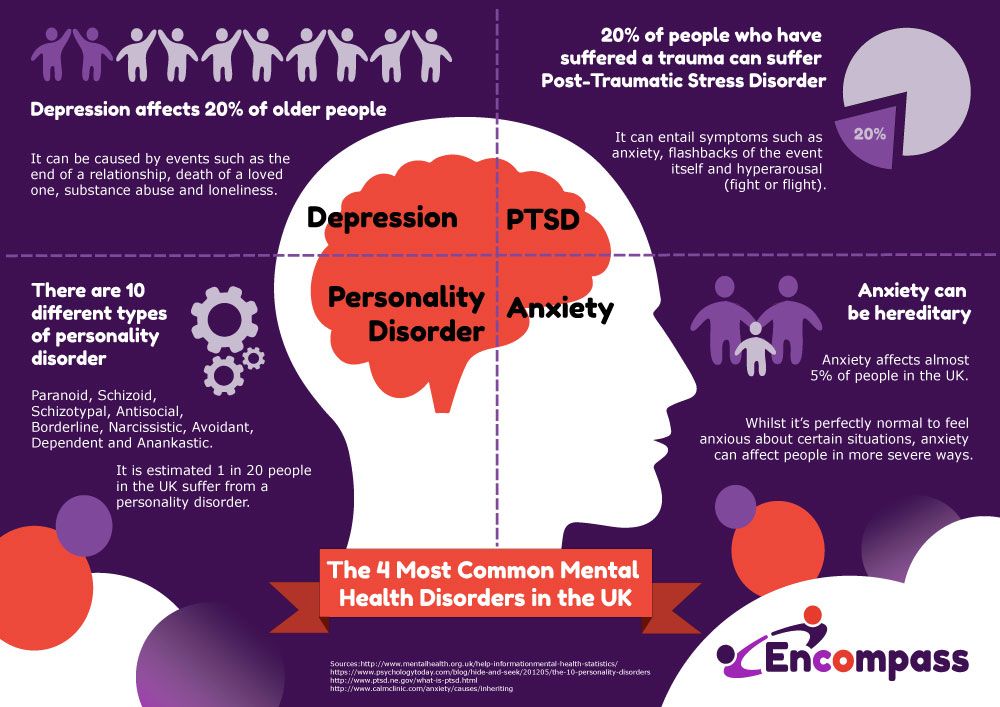 It results from the challenging relationship you may have had with your primary caregivers when you were a child.
It results from the challenging relationship you may have had with your primary caregivers when you were a child.
Avoidant attachment is a way of relating to others and conceiving relationships. You may be dismissive of others, have a strong sense of independence, and feel uncomfortable expressing your feelings.
AVPD, on the other hand, is a personality disorder and formal mental health condition that requires meeting the diagnostic criteria.
Having an avoidant attachment style may often go hand-in-hand with living with avoidant personality disorder. But not the other way around.
You may have an avoidant attachment but don’t meet the other diagnostic criteria for AVPD, like skipping jobs with high social interaction, feeling inadequate, and being sensitive about criticism.
Yes, it just may look different than what you’re expecting.
Some avoidant people may get their emotional needs met by loving a sports team, pets, TV characters, or specific experiences, says Lynn Zakeri, a licensed clinical social worker in Skokie, Illinois.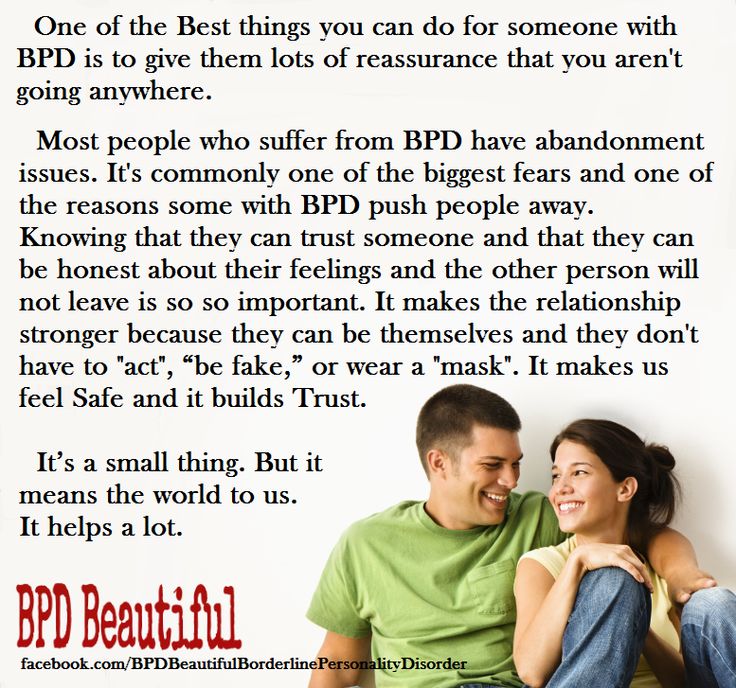
In romantic relationships, love is possible, but it may take a while.
“When they are hurt by someone they love, it can lead to more protection to disengage from close relationships,” she says. “So when a risk is taken to love, it is slow, with an ability to walk away.”
They may love you but still feel insecure about getting too close to you emotionally or they may fear being ridiculed if they open up to you.
Avoidant personality disorder can present unique challenges when it comes to establishing and maintaining romantic relationships.
Emotionally availabilityWhen in a relationship with an avoidant personality, you may feel like you’re not getting back what you give, says Zakeri.
An avoidant partner may also show signs of emotional unavailability.
“We all want connection and to be valued, loved, considered, and cared about. But to someone with AVPD, this initially feels like a responsibility and can be overwhelming,” she says.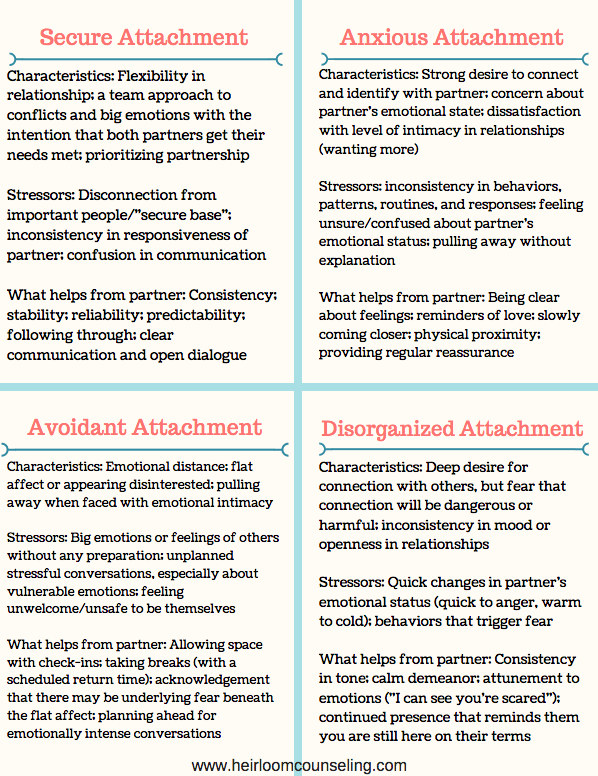
Defenses and distancing behaviors can manifest in several ways, like:
- difficulty being vulnerable
- hard time expressing emotions
- reluctance to commit
- tendency to rely on themselves only
- unhealthy coping mechanisms like substance use
“You will have to trust that their feelings are there for you because they are spending time with you,” she says. Spending time with someone else, for an avoidant personality, is a big deal.
Conflict reluctance
The possibility of conflict may be one reason an avoidant personality retreats and takes emotional and physical distance in a relationship.
An avoidant personality may avoid important conversation topics for fear of what will happen if they’re discussed, says Frayn.
“Avoidance only breeds more shame and anxiety, so working through fears, rather than trying to hide from them, is usually the only way to go,” she adds. “For those who are struggling to navigate these discussions, couples therapy can be helpful to work through your difficulties.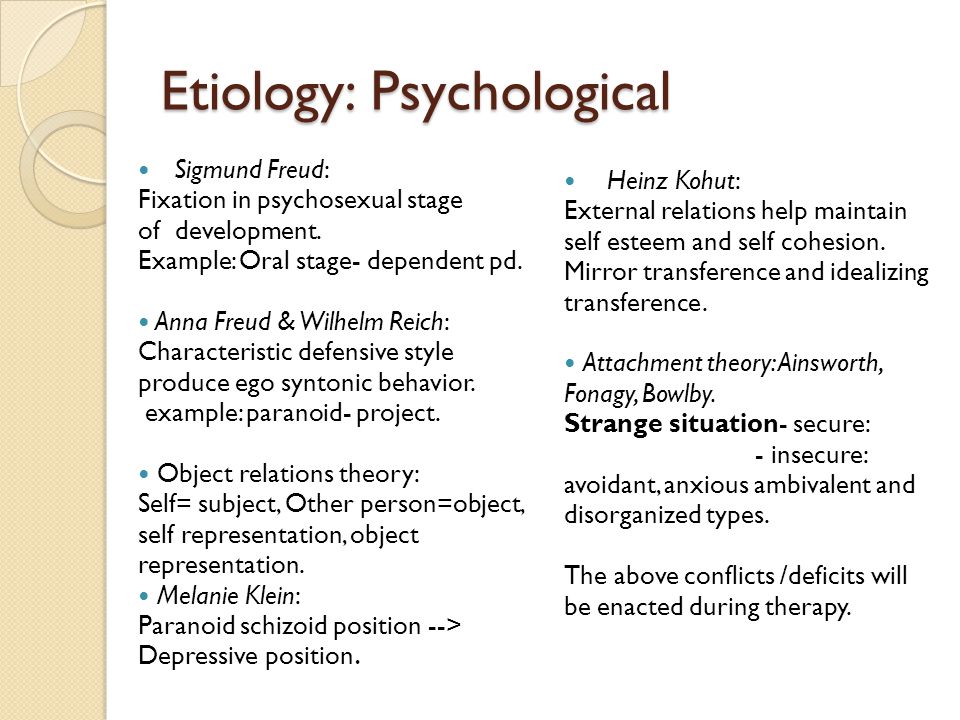 ”
”
Insecurity
With AVPD, feelings of inadequacy and fear of ridicule may run deep.
“Individuals living with this disorder may be particularly sensitive to evaluation and criticism,” says Frayn. “Communicating how you feel and owning your perspectives — like using ‘I’ language rather than pointing fingers or blame at the other — is a great starting point.”
If your relationship with an avoidant personality feels strained, there are ways you can cope.
Try to avoid walking on eggshells“When individuals date someone who has disclosed that they have a personality disorder, they often feel like they have to treat them differently, or walk on eggshells, for fear of ‘triggering’ them or making the problem worse,” says Frayn.
But this can feed into patterns of avoidance and shame, she explains. Instead, consider speaking up about your needs, albeit in a gentle, loving way.
“Transparency is huge,” Frayn explains. “Build trust in each other by being open and honest, sharing your thoughts and feelings, rather than avoiding or hiding.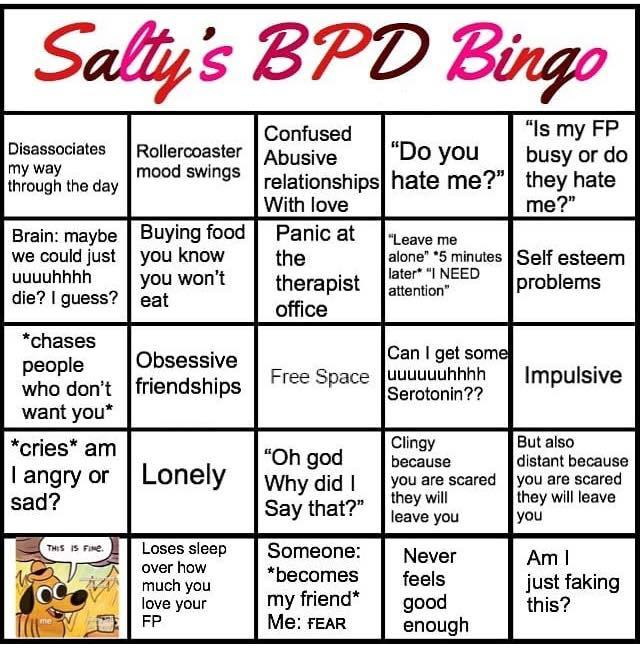 ”
”
What this can sound like:
“I feel sad when I don’t hear from you. I would love a text message over the weekend.”
Try to expand ways to meet your needsAvoidant personalities may mesh well with people who are fairly independent, says Zakeri.
“If you are looking to be prioritized, this may not the person to date,” she explains. “But if you enjoy your own company and like to recharge independently, then having a significant other with an avoidant personality to share experiences with can work.”
What this can look like:
If possible, deepen your own community connections to help support your individual emotional needs.
For example:
- adopting a shelter pet
- developing a new hobby
- spending time with friends and family
- going to therapy
- engaging in acts of altruism
Couples therapy can help you understand your own patterns and how your avoidant partner’s life experiences have shaped how they cope, says Frayn.
For those with AVPD, “Relationships can, in fact, be quite reparative if they are able to create and foster new patterns of relating to themselves and others,” she says. “Old and problematic patterns tend to repeat themselves unless efforts are made [otherwise], so therapy is a great way to learn skills and strategies to do differently moving forward.”
In other words, positive relationship experiences can be healing for avoidant personalities. Finding a therapist to work together on this may work well.
What this can sound like:
“I feel frustrated and sometimes I don’t know how to handle it. But I want to understand you better. Can we try couples therapy for a while?”
Avoidant personality disorder and relationships can be a challenging mix, but it’s possible to make it work.
An avoidant personality may have difficulty with intimacy, self-confidence, and interpersonal interaction. Emotional unavailability may also be a problem.
Working with a therapist, working on communication skills, and giving each other reassurance may help.
Avoidant Personality and Relationships: Does It Work?
Living with avoidant personality disorder may mean you skip most social situations, experience intense fear of criticism, and find it hard to share feelings. But you can still make relationships work.
Try to think of a time when someone hurt your feelings intensely and you withdrew into your own world for some space to heal. For some people with an avoidant personality, this may be an everyday reality in their relationships.
Avoidant personality disorder (AVPD) is a mental health condition characterized by:
- intense avoidance of social situations
- feelings of inadequacy
- sensitivity to criticism
This may mean people with avoidant personality and their romantic partners may face a few specific challenges in relationships.
According to the Diagnostic and Statistical Manual of Mental Disorders, 5th edition, text revision (DSM-5-TR), the formal symptoms of AVPD are:
- avoiding jobs or other occupational events that may involve interacting with other people
- reluctance to engage in close relationships or tendency to put up walls out of fear of ridicule or shaming
- need for reassurance when being involved with other people
- nervous about rejection and negative evaluation in everyday scenarios
- holding back when meeting new people
- poor self-concept or feeling inferior and unappealing
- risk-averse for anything potentially embarrassing
To receive a diagnosis, at least four of these seven symptoms must be evident persistently across situations and over time.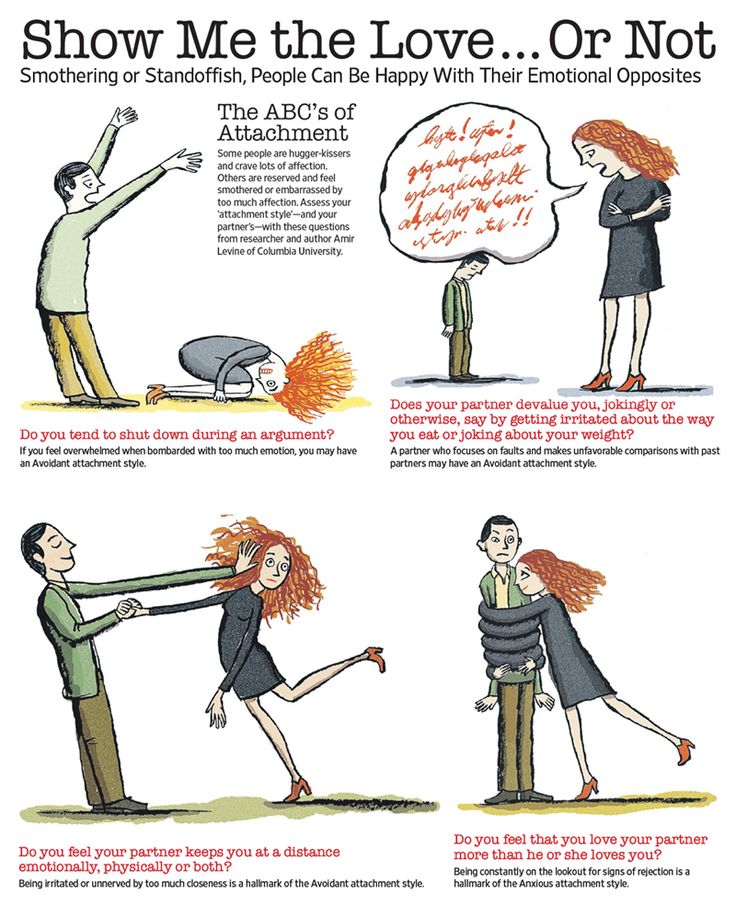
Does this mean you prefer not to have a relationship if you have an avoidant personality? Not necessarily.
Not all people with an avoidant personality meet the 7-symptom criteria. So, it’s possible that some people may want to establish relationships, even if it’s challenging for them to maintain them.
At the end of the day, it depends on the person. No two people with AVPD will feel exactly the same.
Some research suggests that people with AVPD feel lonely and typically long for connection. They, however, fear what will happen if they get too close, says Dr. Mallory Frayn, a clinical psychologist in Montreal.
Also, an avoidant personality may want a relationship but fear of ridicule and poor self-confidence may lead them to avoid the chance of getting into one, deepening their sense of inadequacy.
Avoidant attachment vs. avoidant personality
Avoidant attachment and avoidant personality are two different things.
Avoidant attachment refers to a type of insecure attachment or unhealthy way to relate to other people.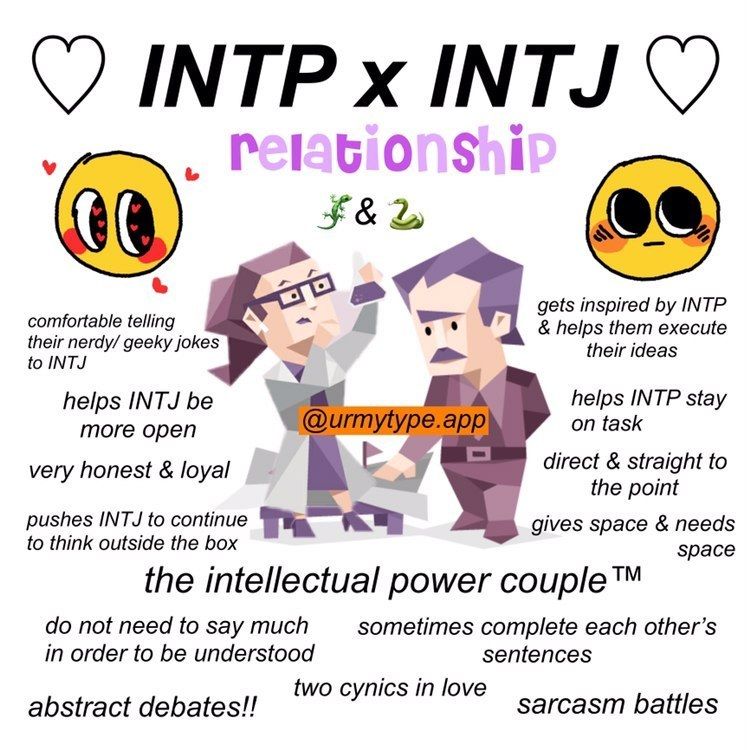 It results from the challenging relationship you may have had with your primary caregivers when you were a child.
It results from the challenging relationship you may have had with your primary caregivers when you were a child.
Avoidant attachment is a way of relating to others and conceiving relationships. You may be dismissive of others, have a strong sense of independence, and feel uncomfortable expressing your feelings.
AVPD, on the other hand, is a personality disorder and formal mental health condition that requires meeting the diagnostic criteria.
Having an avoidant attachment style may often go hand-in-hand with living with avoidant personality disorder. But not the other way around.
You may have an avoidant attachment but don’t meet the other diagnostic criteria for AVPD, like skipping jobs with high social interaction, feeling inadequate, and being sensitive about criticism.
Yes, it just may look different than what you’re expecting.
Some avoidant people may get their emotional needs met by loving a sports team, pets, TV characters, or specific experiences, says Lynn Zakeri, a licensed clinical social worker in Skokie, Illinois.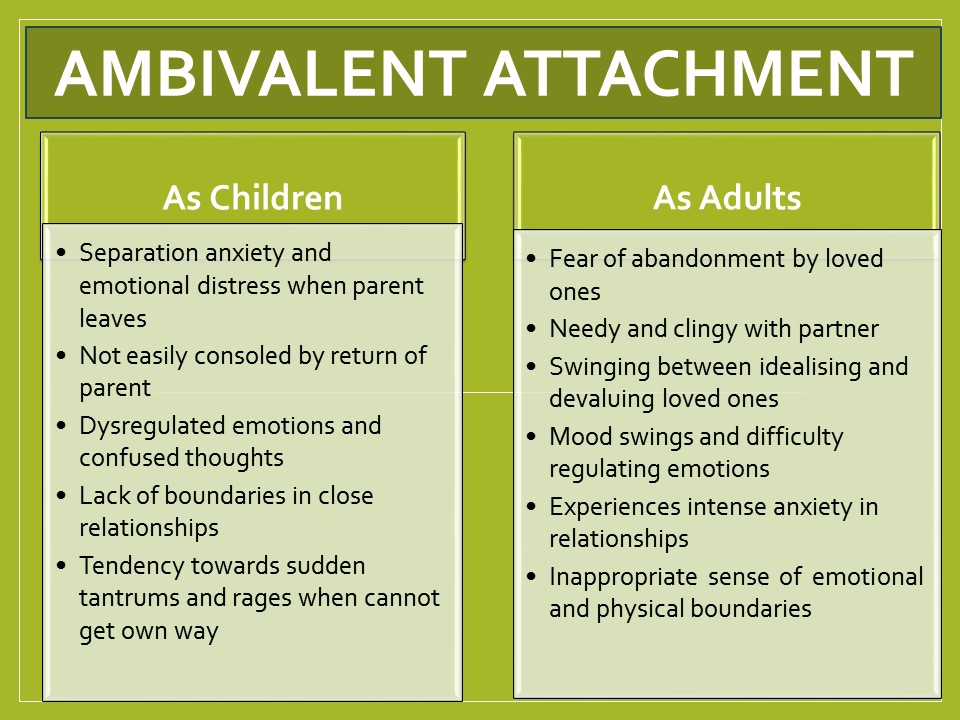
In romantic relationships, love is possible, but it may take a while.
“When they are hurt by someone they love, it can lead to more protection to disengage from close relationships,” she says. “So when a risk is taken to love, it is slow, with an ability to walk away.”
They may love you but still feel insecure about getting too close to you emotionally or they may fear being ridiculed if they open up to you.
Avoidant personality disorder can present unique challenges when it comes to establishing and maintaining romantic relationships.
Emotionally availabilityWhen in a relationship with an avoidant personality, you may feel like you’re not getting back what you give, says Zakeri.
An avoidant partner may also show signs of emotional unavailability.
“We all want connection and to be valued, loved, considered, and cared about. But to someone with AVPD, this initially feels like a responsibility and can be overwhelming,” she says.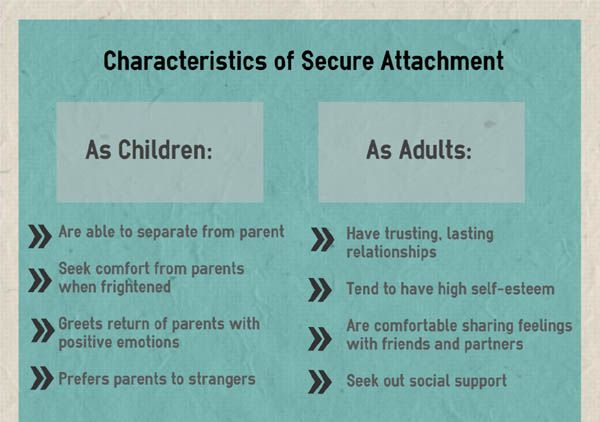
Defenses and distancing behaviors can manifest in several ways, like:
- difficulty being vulnerable
- hard time expressing emotions
- reluctance to commit
- tendency to rely on themselves only
- unhealthy coping mechanisms like substance use
“You will have to trust that their feelings are there for you because they are spending time with you,” she says. Spending time with someone else, for an avoidant personality, is a big deal.
Conflict reluctance
The possibility of conflict may be one reason an avoidant personality retreats and takes emotional and physical distance in a relationship.
An avoidant personality may avoid important conversation topics for fear of what will happen if they’re discussed, says Frayn.
“Avoidance only breeds more shame and anxiety, so working through fears, rather than trying to hide from them, is usually the only way to go,” she adds. “For those who are struggling to navigate these discussions, couples therapy can be helpful to work through your difficulties. ”
”
Insecurity
With AVPD, feelings of inadequacy and fear of ridicule may run deep.
“Individuals living with this disorder may be particularly sensitive to evaluation and criticism,” says Frayn. “Communicating how you feel and owning your perspectives — like using ‘I’ language rather than pointing fingers or blame at the other — is a great starting point.”
If your relationship with an avoidant personality feels strained, there are ways you can cope.
Try to avoid walking on eggshells“When individuals date someone who has disclosed that they have a personality disorder, they often feel like they have to treat them differently, or walk on eggshells, for fear of ‘triggering’ them or making the problem worse,” says Frayn.
But this can feed into patterns of avoidance and shame, she explains. Instead, consider speaking up about your needs, albeit in a gentle, loving way.
“Transparency is huge,” Frayn explains. “Build trust in each other by being open and honest, sharing your thoughts and feelings, rather than avoiding or hiding.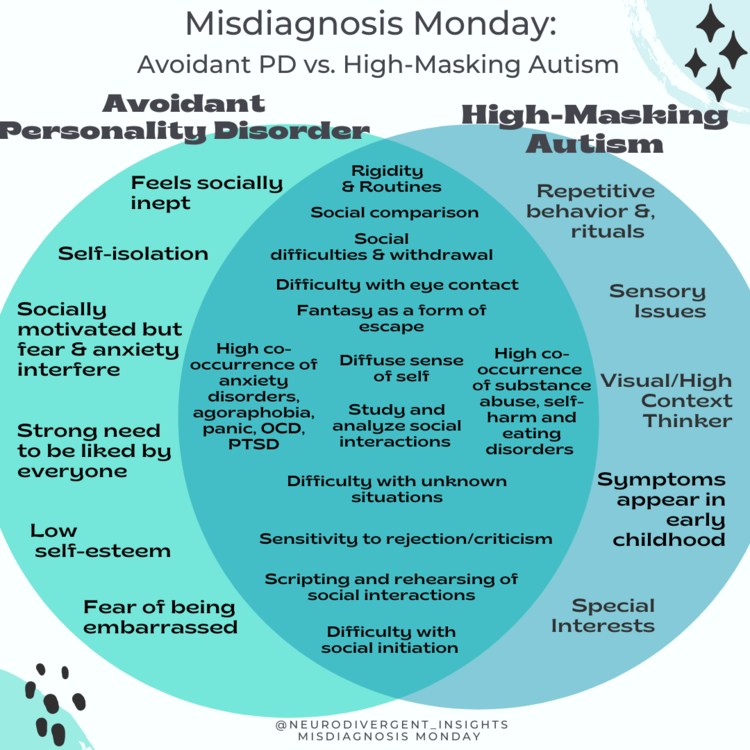 ”
”
What this can sound like:
“I feel sad when I don’t hear from you. I would love a text message over the weekend.”
Try to expand ways to meet your needsAvoidant personalities may mesh well with people who are fairly independent, says Zakeri.
“If you are looking to be prioritized, this may not the person to date,” she explains. “But if you enjoy your own company and like to recharge independently, then having a significant other with an avoidant personality to share experiences with can work.”
What this can look like:
If possible, deepen your own community connections to help support your individual emotional needs.
For example:
- adopting a shelter pet
- developing a new hobby
- spending time with friends and family
- going to therapy
- engaging in acts of altruism
Couples therapy can help you understand your own patterns and how your avoidant partner’s life experiences have shaped how they cope, says Frayn.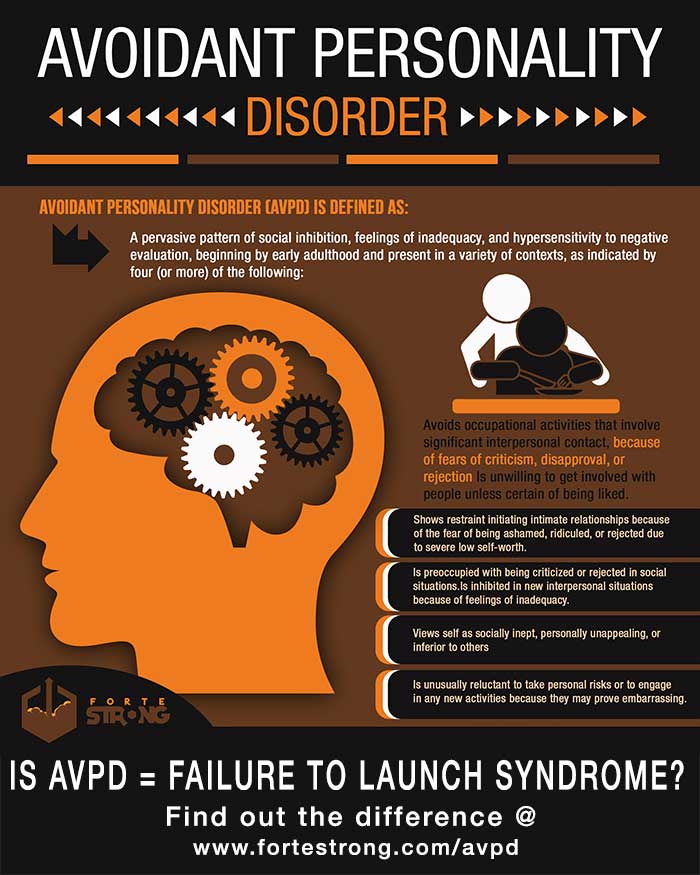
For those with AVPD, “Relationships can, in fact, be quite reparative if they are able to create and foster new patterns of relating to themselves and others,” she says. “Old and problematic patterns tend to repeat themselves unless efforts are made [otherwise], so therapy is a great way to learn skills and strategies to do differently moving forward.”
In other words, positive relationship experiences can be healing for avoidant personalities. Finding a therapist to work together on this may work well.
What this can sound like:
“I feel frustrated and sometimes I don’t know how to handle it. But I want to understand you better. Can we try couples therapy for a while?”
Avoidant personality disorder and relationships can be a challenging mix, but it’s possible to make it work.
An avoidant personality may have difficulty with intimacy, self-confidence, and interpersonal interaction. Emotional unavailability may also be a problem.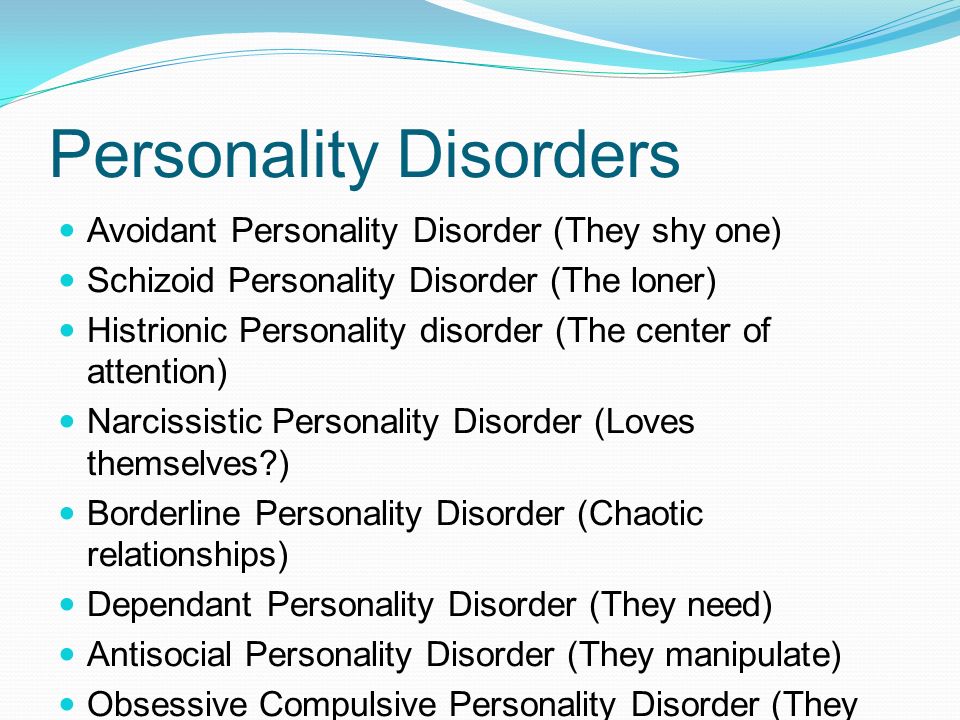
Working with a therapist, working on communication skills, and giving each other reassurance may help.
How a person with avoidant personality disorder feels and how to help him - Empathy
How a person with avoidant personality disorder feels and how to help him - Empathy - mental health center- Home
- Articles
- How a person with avoidant personality disorder feels and how to help them
Avoidant (anxiety) disorder is one of the most common personality pathologies. IPD can develop alone, and may be present in conjunction with panic, anxiety-depressive, obsessive-compulsive, generalized anxiety disorder.
IRL is a rather severe psychopathology in terms of its impact on a person's everyday social and professional life.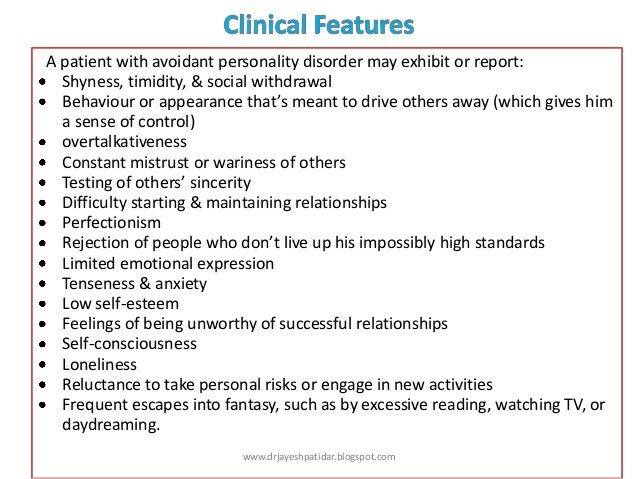 In avoidant personality disorder, behavior is based on the following negative patterns :
In avoidant personality disorder, behavior is based on the following negative patterns :
- avoidance of closeness with others and social contacts, as they are anxiety triggers;
- negative assessment of one's own personality: fixation on shortcomings, neglect of one's positive features, as well as desires and goals;
- stable ideas about oneself as an inadequate, uncomfortable, unwanted, isolated person.
Behavior based on such beliefs leads to a number of problems. From simple everyday things - for example, it is difficult for a person to make a phone call, ask a passerby for directions, or place an order in a cafe - to difficulties in building friendships and romantic relationships, getting an education and finding a job that would adequately meet the capabilities and aspirations of a person. As a result the quality of life is greatly reduced , and in the worst cases, patients have a pronounced social disadaptation .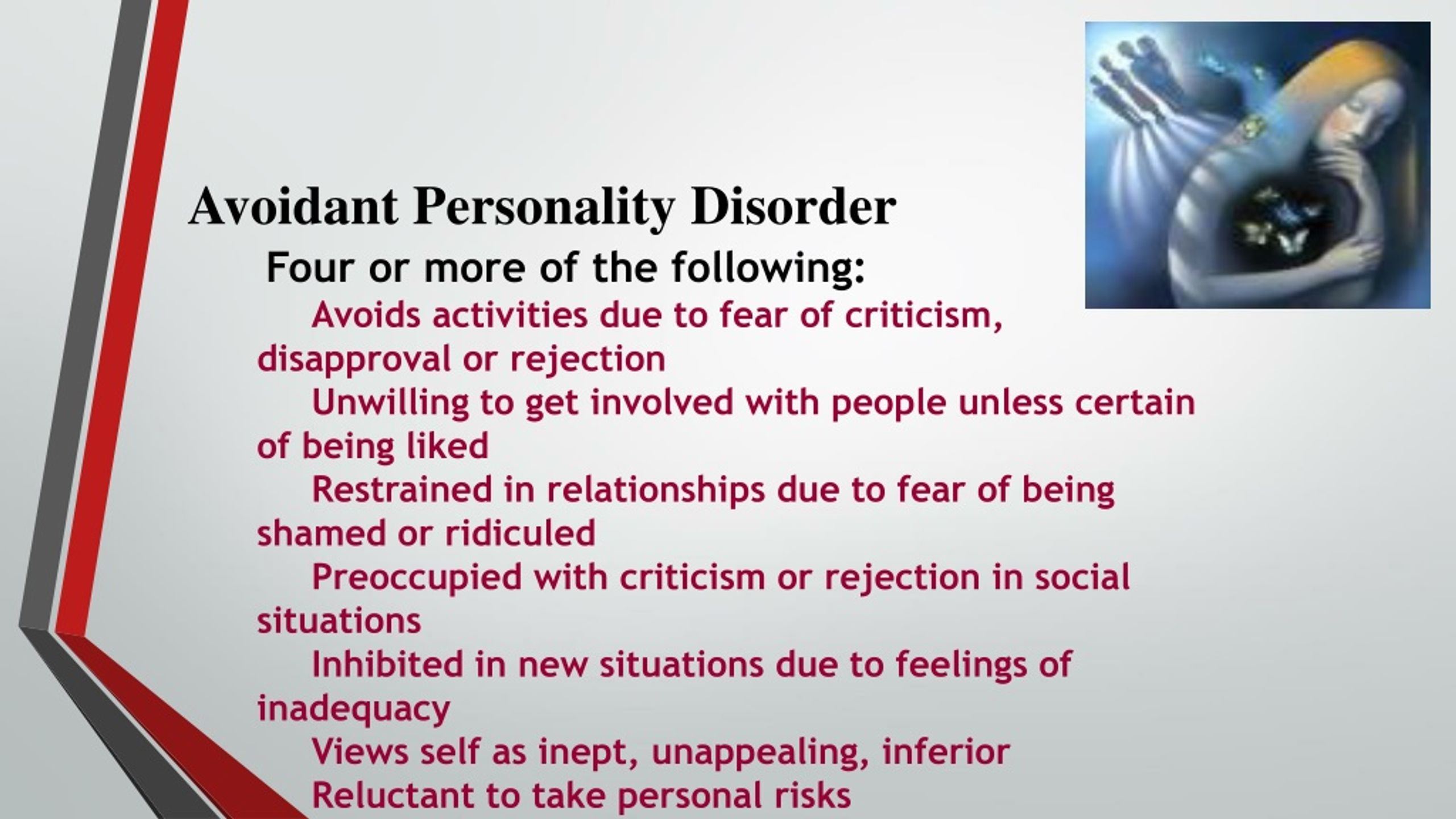
In addition, people with IPD have a higher risk of becoming dependent on psychoactive substances and alcohol, developing cardiovascular, neurological, gastroenterological and other somatic diseases.
From the outside it may seem that people with HDI are closed introverts, but in reality this is not so. In fact, behind the attempts to isolate themselves from social interactions and activities that cause anxiety, lies the desire to be accepted , the desire for approval and praise from others, and most importantly - the need for comfortable communication and trusting relationships with colleagues, friends, partners. Not finding this for one reason or another, the “avoiding” person again tries to hide in a shelter built with his own hands from imaginary shortcomings, unreasonably predicting his failures in advance.
What to do if you suspect an anxious personality disorder? If you have disturbing symptoms, you should visit a mental health professional for a professional mental health assessment.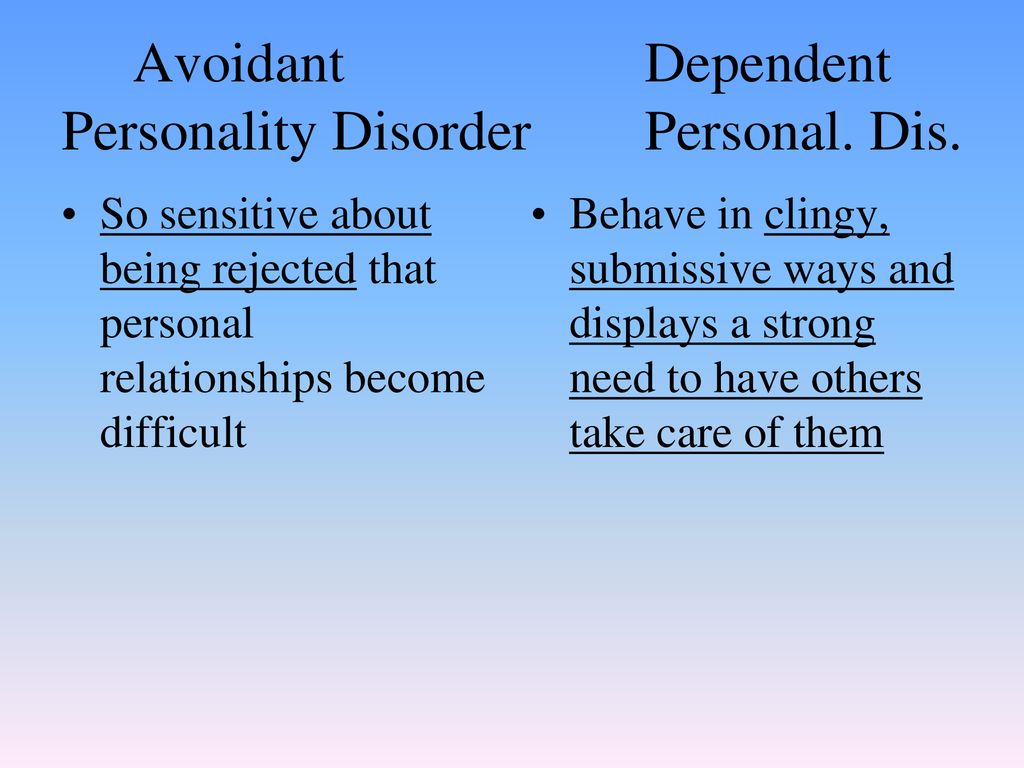 Timely detection of the disorder will allow immediate treatment and avoid serious consequences.
Timely detection of the disorder will allow immediate treatment and avoid serious consequences.
An overwhelming number of studies in the treatment of personality disorders, including IPD, demonstrate the benefits of combining psychotherapy and pharmacological support.
Among drugs for the treatment of anxiety symptoms with somatic and vegetative manifestations, antidepressants (primarily SSRIs and SNRIs) demonstrate the greatest therapeutic efficacy. For the rapid removal of symptoms in the first weeks of therapy, it is possible to use anxiolytic drugs and tranquilizers.
With regard to psychotherapy, the most effective methods for avoidant personality disorder are cognitive behavioral therapy and schema therapy.
How can we help?
If you have found some of the described symptoms in yourself or your loved ones, this may indicate the development of a mental disorder. In this case, it is worth contacting a psychiatrist for diagnosis and initiation of timely treatment.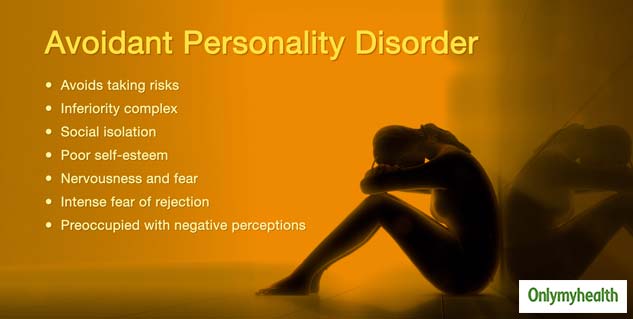 Beyond face-to-face communication , we offer the service remote consultation (online reception) , which is not inferior to a face-to-face meeting in quality. Thus, you can get qualified help from high-level specialists, no matter where you are. Beyond face-to-face communication , we offer the service remote consultation (online reception) , which is not inferior to a face-to-face meeting in quality. Thus, you can get qualified help from high-level specialists, no matter where you are. | |
Our Mental Health and Psychological Assistance Centers, located within walking distance of the Elektrozavodskaya (Moscow) and Novokosino (Reutov) metro stations, employ specialists who have extensive experience in treating mental disorders. We use the most advanced techniques, guided by the principles of evidence-based medicine. Effective assistance and confidentiality of information constituting a medical secret are guaranteed.
Avoidant personality disorder., Psychology - Gestalt Club
Avoidant personality disorder.
- Author of the article: Artem Khmelevsky
Avoidance disorder (anxiety disorder) is a condition in which the individual experiences increased anxiety about their shortcomings.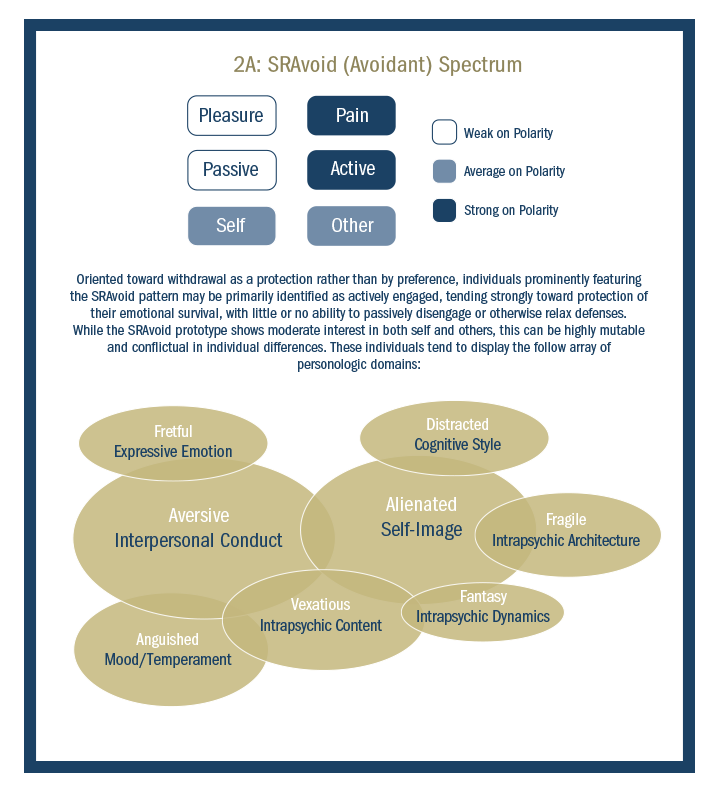 As a result, a person avoids contact with people, avoids communication, shows shyness.
As a result, a person avoids contact with people, avoids communication, shows shyness.
Due to uncertainty and fear, problems arise in interpersonal relationships. Close relationships avoiding personality they line up only with those who cannot abandon and reject them. They are very afraid of rejection. But more often than not, preference is given to loneliness to minimize risks as much as possible. Criticism and disapproval hurts a lot.
The person is afraid of being ridiculed or negatively appreciated. A tormenting feeling of inferiority makes one avoid new acquaintances. For protection purposes, they position themselves as individualists. The state and behavior of the individual in many ways reminiscent of social phobia.
People with avoidance disorder subconsciously expect support, approval and reassurance from other people, but no external forces will change the inner unrest.
How do you define avoidance disorder? The point is that people with this personality accentuations, the following deep beliefs:
1.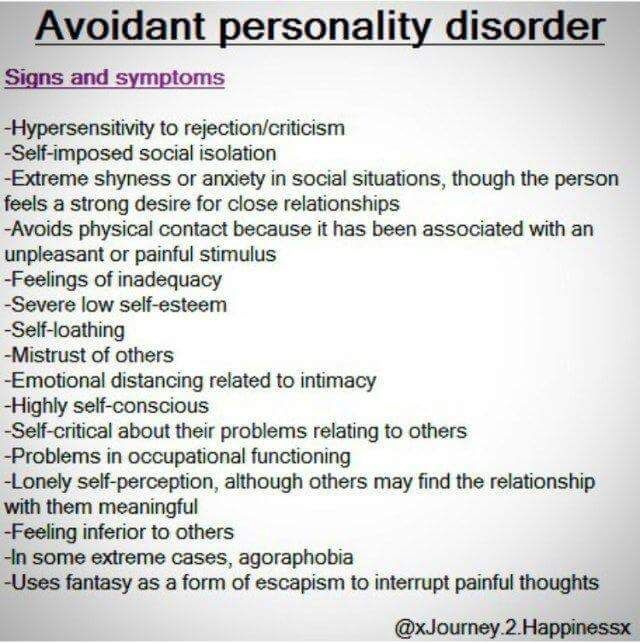 I am socially unfit and undesirable in situations of work or communication.
I am socially unfit and undesirable in situations of work or communication.
2. Other people are potentially critical, indifferent, tend to humiliate or reject me.
3. I cannot bear unpleasant feelings.
4. If people get close to me, they will discover who I am and reject me.
5. It is unbearable to be considered inferior or inadequate.
6. I must avoid unpleasant situations at all costs.
7. If I feel or think something unpleasant, I should try to forget about it or get distracted, for example, think about anything else, drink, take a pill or watch TV.
8. I must avoid situations in which I draw attention or be as inconspicuous as possible.
9. Unpleasant feelings will intensify and get out of control.
10. If others criticize me, they are probably right.
11. Better to do nothing than to try to do what you can end in failure.
12. If I don't think about a problem, I don't need to solve it.
13. Any signs of tension in the relationship indicate that relations deteriorated; therefore, they must be broken.